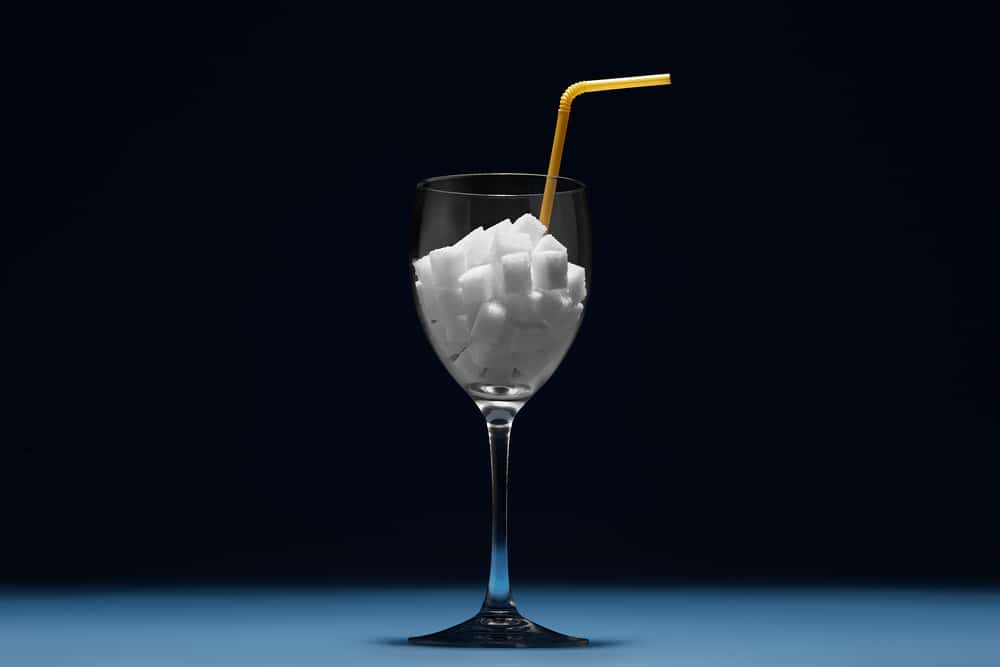It goes without saying the beer sitting in your fridge is alcohol and that the powder you pour on your coffee is sugar. But what about sugar alcohol, do you know what it is and where to find it? And is sugar alcohol safe for dogs?
Most sugar alcohols are safe for dogs and will only cause some gastrointestinal irritation if consumed, such as erythritol, maltitol, lactitol, and sorbitol. On the other hand, xylitol is toxic and can be fatal. Always talk to your vet before introducing any changes to your dog’s diet.
Table of Contents
What Is Sugar Alcohol?

Sugar alcohols are neither sugar nor alcohol. Instead, they are compounds that usually occur naturally in some fruits and vegetables and are mainly used to replace sugar. They are really common in the food industry – although they can be found in other sectors as well – and you have probably already eaten one of them without even knowing it.
Although sugar alcohols don’t taste exactly like sugar, they are mostly used to sweeten and work as a substitute for sugar in order to provide fewer calories. Since it has a lower impact on glucose and insulin levels, they are really popular among diabetics and people who are trying to achieve a healthier lifestyle. They still have an impact on your health if you have too much of them and can cause some minor gastrointestinal discomfort but they are less harmful than sugar, so they are a good option if you are trying to lessen the sugar in your life.
What Are The Most Common Sugar Alcohols?
If you have ever eaten a food labeled as “sugar-free,” you’ve probably already eaten one of these sugar alcohols below. Let’s check the most common sugar alcohols you can find.
Erythritol
Erythritol is 70% as sweet as sugar and it occurs in pears, watermelon, soy sauce, and some other fruit and vegetables. People accept it in general because its taste really resembles sugar and it is often in sugar-free foods and beverages.
Maltitol
Maltitol basically comes from corn syrup and is about 75% as sweet as sugar. Manufacturers widely use it in candies, desserts, and baked foods, and it can provide a creamy texture to food.
Lactitol
Lactitol comes from milk and is about 30 to 40% as sweet as sugar. Not surprisingly, manufacturers use it a lot in ice creams, chocolates, candies, and also chewing gums.
Sorbitol
Sorbitol is 50% as sweet as sugar and it is naturally found in some fruit and vegetables. It is often used in candies in general and sugar-free gums.
Xylitol
Xylitol can be found in straw, some cereals, mushrooms, and corncobs. It is as sweet as sugar and it is largely used in chewing gums, and, surprisingly, in some oral care products such as toothpaste and mouthwash.
Can Dogs Eat Sugar Alcohol?
We obviously already know that the best foods for dogs are the ones that are appropriate to them or something natural like a fruit or a vegetable. But sometimes our buddies are such dogs that we feel like giving them something extra special – like that sugar-free peanut butter that is on the shelf. In that case, know that your dog is clear to eat most sugar alcohols.
The majority of sugar alcohols are indeed safe for dogs. Depending on the amount though, it can cause some gastrointestinal discomfort. As a result, the dog can feel nauseous and flatulent or even present diarrhea and vomiting. So, if you are looking to please your pet, just make sure the dose is small.
Xylitol is the only exception since is terribly toxic for pets, and it must not be given under any circumstances. Once ingested, it is quickly absorbed, and it causes a rapid release of insulin by the pancreas, which results in a drastic decrease in glucose (sugar) blood levels. Hypoglycemia (low blood sugar) then evolves into weakness, incoordination, seizures, and if not properly treated, can result in death.
I know sometimes the look on their faces is irresistible. But whatever you do, just remember to check for xylitol before letting them taste your food.
What Should I Do If My Dog Eats Sugar Alcohol?
If your dog has just licked the “sugar-free” ice cream that you accidentally dropped on the kitchen floor and you’ve just checked that it has lactitol on it, you probably don’t have much to worry about. Just make sure you keep an eye on your furry friend in the next hours and help it feel comfortable if you notice something different. It may feel a little bloated or have its bowels a little loose, depending on its size, but nothing further than that.
Now, if your dog has stolen a lot of chewing gums from your purse and they happen to have xylitol as one of the ingredients, you’ll want to take a different approach. The recommendation is to take your pet straight to the veterinarian for monitoring since it can take a few hours before it starts to show any symptoms and the sooner the case is reversed, the better.
Dogs are unpredictable, and accidents can always happen. The important thing is to always be alert and to act quickly in case of unexpected situations.
Conclusion: Is Sugar Alcohol Safe For Dogs?
In conclusion, we can say that most sugar alcohols are safe for dogs, except for xylitol. While erythritol, maltitol, lactitol, and sorbitol can just cause some diarrhea and vomiting if the amount is too much, xylitol ingestion can be fatal. So, excluding one-off situations in which you want to please your pet in a different way, the best course of action is to choose natural foods or appropriate treats to give our dogs.
Do you usually consume sugar-free products? And does your dog beg a lot for whatever you’re eating? Tell us all about it in the comments below!
